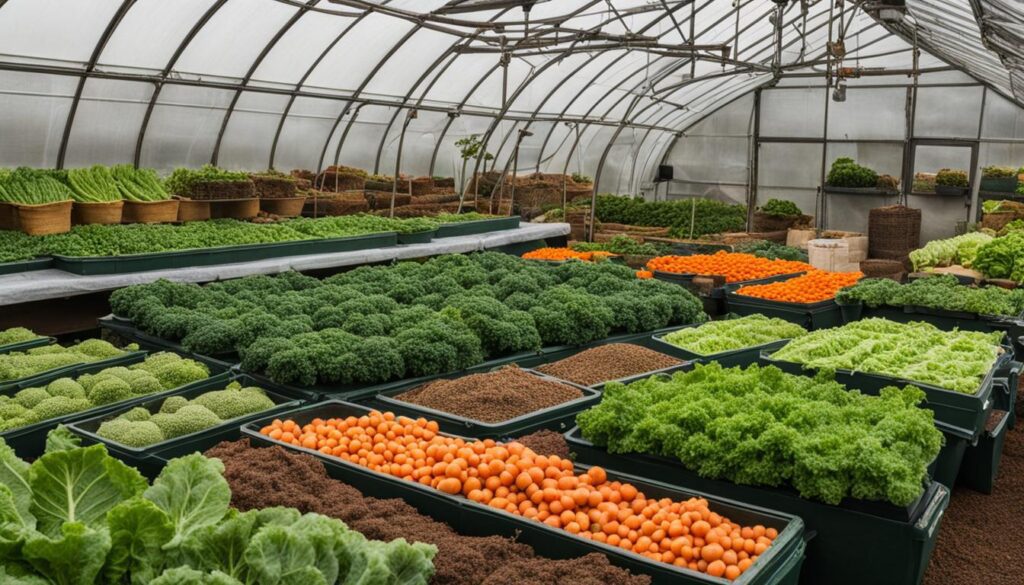Many people dream of turning their passion for gardening into a profitable venture. The idea of making money from your green thumb may seem like a fantasy, but with the right approach, it can be a reality. Becoming a garden coach is one way to monetize your gardening knowledge and experience. As a coach, you can teach others the skills and techniques they need to succeed in their own gardens. You don’t need to be an expert, just a few steps ahead of your students. What matters most is your ability to empathize with your students and help them overcome the challenges they face. By developing a system for teaching and sharing your knowledge, you can create a viable business opportunity.
Post Summary
- Turning your passion for gardening into a profitable venture is possible.
- Becoming a garden coach allows you to monetize your knowledge and experience.
- You don’t need to be an expert to be a successful garden coach.
- Empathy and the ability to help others overcome challenges are important qualities for a garden coach.
- Developing a system for teaching and sharing your knowledge can create a viable business opportunity.
Side Income Opportunities from Your Garden
While bringing in a full-time income from gardening can be challenging, there are plenty of opportunities to earn a side income throughout the year. Even if you have limited space, there are ways to make use of the resources you have. For example, you can grow microgreens and sprouts indoors during the winter months, when demand for fresh greens is high. Selling seeds, cuttings, and mushrooms are also profitable ventures. By diversifying your offerings and finding your niche, you can generate income from your garden year-round.
| Side Income Opportunities | Profitability |
|---|---|
| Growing microgreens and sprouts indoors | High |
| Selling seeds | Moderate |
| Selling cuttings | Moderate |
| Growing mushrooms | High |
Microgreens and sprouts are in high demand during the winter months when fresh greens are scarce. By growing them indoors, you can supply your local market with these nutritious and flavorful greens. Selling seeds can also be a profitable venture, particularly if you specialize in unique or heirloom varieties. Additionally, selling cuttings from your established plants can be a lucrative side income opportunity, as many gardeners are looking to expand their plant collections. Finally, growing mushrooms, such as oyster mushrooms or shiitake mushrooms, can provide a year-round income stream, as they can be cultivated indoors or in a small outdoor space.
When exploring side income opportunities from your garden, it’s important to consider your target market and the profitability of each venture. Conduct market research to identify which products are in demand and assess the pricing and competition in your area. By strategically diversifying your offerings and finding your niche, you can create a sustainable side income from your garden throughout the year.
Winter Garden Income Ideas
Winter can be a surprisingly lucrative season for gardeners, offering various income opportunities. One such opportunity is indoor gardening, specifically growing microgreens and sprouts. During the winter months, the demand for fresh greens is high, and you can capitalize on this by selling microgreens to local farms or through Community Supported Agriculture (CSA) shares. Microgreens are young vegetable seedlings that are packed with nutrients and can be grown indoors with minimal space and equipment.
Another way to generate income during winter is by starting a small backyard seed company. Many customers are looking for sustainably grown and locally adapted seeds, and by offering a unique selection, you can attract a niche market. Additionally, selling cuttings from established plants and learning to grow mushrooms indoors can be profitable ventures. By exploring these winter gardening income ideas, you can continue to monetize your garden and generate revenue even during the colder months.
Winter Garden Income Ideas
| Income Idea | Description |
|---|---|
| Indoor Salad Gardening | Grow microgreens and sprouts indoors during winter months to meet the high demand for fresh greens. |
| Backyard Seed Company | Start a small seed company, offering sustainably grown and locally adapted seeds. |
| Selling Cuttings | Sell cuttings from established plants to gardening enthusiasts and collectors. |
| Indoor Mushroom Cultivation | Learn to grow mushrooms indoors and sell them as a specialty crop. |
Spring Garden Income Opportunities
Spring is a prime time for gardeners, as everyone’s attention turns to their own gardens. It’s the perfect season to capitalize on the demand for fresh produce and unique plants. Here are some income opportunities to consider:
Growing and Selling Dandelions
While many people try to eradicate dandelions from their lawns, others embrace their culinary and medicinal value. Dandelion greens are packed with nutrients and can be used in salads, smoothies, and other dishes. By growing and selling dandelions, you can tap into the growing market for edible “weeds” and offer a unique product to health-conscious consumers.
Exploring Ephemerals
Spring ephemerals are plants that have a short harvesting window but are in high demand due to their unique characteristics. For example, ramps, also known as wild leeks, are highly sought after for their delicate flavor and limited availability. By cultivating and selling ephemerals like ramps, you can command premium prices and cater to customers looking for rare and seasonal ingredients.
| Product | Description | Profit Margin |
|---|---|---|
| Dandelions | Harvest and sell dandelion greens for culinary use. | High |
| Ephemerals | Cultivate and sell unique springtime plants like ramps. | High |
By diversifying your offerings and tapping into niche markets, you can generate income from your garden during the spring season. Remember to market your products effectively, highlighting their unique qualities and seasonal availability.
Benefits of Documenting Your Garden Journey
Here are some key benefits of documenting your garden journey:
- Establishing yourself as an authority in the garden coaching industry
- Developing your own teaching methodology
- Creating valuable content to share with students and clients
- Reflecting on your own experiences and lessons learned
- Refining your coaching approach
By regularly documenting your garden journey, you can build a rich resource of knowledge and experiences that will enhance your coaching business and provide valuable insights to others in the gardening community.
The Importance of Persistence and Continuous Learning
Building a successful gardening business requires persistence and a commitment to continuous learning. By continuously expanding your knowledge and refining your gardening skills, you can stay ahead in this ever-growing industry. In the world of gardening, there is always something new to discover and explore, whether it’s a new technique, plant variety, or pest control method. By staying curious and open to learning, you can ensure that your garden thrives and your business flourishes.
Continuous learning in gardening allows you to expand your knowledge base and stay up-to-date with the latest trends and best practices. It enables you to experiment with new techniques and explore innovative solutions to common gardening problems. Whether you attend workshops, take online courses, or read books and articles, every bit of new knowledge you acquire contributes to your growth as a gardener and as a business owner.
Expanding your knowledge and refining your gardening skills not only benefits your own garden but also enhances your credibility as a garden coach or gardening business owner. Clients are more likely to trust someone who demonstrates a deep understanding of gardening principles and practices. They will appreciate your ability to provide expert advice, troubleshoot problems, and help them achieve their gardening goals.
Ultimately, persistence and continuous learning are key to staying relevant and competitive in the gardening industry. By embracing lifelong learning and seeking out opportunities to expand your knowledge, you can ensure that your gardening business continues to thrive and grow.
Benefits of Persistence and Continuous Learning in Gardening
- Stay updated with the latest gardening trends and techniques
- Enhance your credibility and expertise as a garden coach or business owner
- Experiment with new gardening methods and solutions
- Provide valuable advice and problem-solving to clients
- Maintain a thriving garden and business
Embrace the joy of continuous learning and the rewards it brings to your gardening business. Take advantage of the wealth of resources available and commit to expanding your knowledge and refining your gardening skills. By doing so, you’ll be well-equipped to navigate the ever-changing gardening landscape and build a successful and prosperous business.
Building Your Brand and Marketing Your Gardening Business
Building a strong brand and implementing effective marketing strategies are crucial steps in turning your gardening business into a profitable venture. By establishing a recognizable brand identity and establishing an online presence, you can attract potential clients and differentiate yourself from the competition.
To begin, focus on defining your unique selling proposition (USP). This is what sets you apart from other gardening businesses and communicates the value you provide to your customers. Consider what makes your approach to gardening coaching or your side income offerings unique and use that as the foundation for your brand identity.
Once you have established your brand, it’s important to develop a comprehensive marketing strategy. This strategy should include both online and offline tactics to reach your target audience effectively. Utilize social media platforms to showcase your expertise and engage with potential clients. Create a website or blog where you can share valuable gardening content and attract organic traffic. Consider offering free resources, such as guides or e-books, to capture leads and build your email list.
To solidify your brand and expand your reach, networking and collaborating with other gardeners can be highly beneficial. Join local gardening clubs, attend events and workshops, and engage with online gardening communities. Building relationships within the garden community can open up new opportunities, provide valuable insights, and help you tap into new markets.
Online Marketing Channels for Gardening Businesses
| Channel | Description |
|---|---|
| Social Media | Utilize platforms like Facebook, Instagram, and Pinterest to share gardening tips, showcase your work, and engage with potential clients. |
| Website or Blog | Create a professional website or blog to establish your online presence, showcase your expertise, and attract organic traffic from search engines. |
| Email Marketing | Build an email list by offering valuable resources and consistently delivering relevant content, promotions, and updates to your subscribers. |
| Online Advertising | Consider investing in online advertising platforms like Google Ads or Facebook Ads to reach a wider audience and drive targeted traffic to your website or landing pages. |
| Collaborations | Collaborate with other gardening influencers or businesses to expand your reach, cross-promote each other’s content, and tap into new markets. |
By strategically building your brand and implementing effective marketing strategies, you can position your gardening business for success. Remember to consistently monitor and evaluate your marketing efforts to identify what works best for your target audience and adjust your strategies accordingly. With dedication, creativity, and a strong brand presence, you can attract clients, grow your business, and achieve financial success in the gardening industry.
Networking and Collaborating with Other Gardeners
Networking and collaborating with other gardeners can greatly benefit your gardening business. By connecting with fellow enthusiasts and professionals in the garden community, you can expand your reach, gain valuable insights, and create new opportunities for growth. Whether through local gardening clubs, online communities, or attending workshops and events, building relationships within the garden industry can have a positive impact on your business.
When networking with other gardeners, be open to sharing your own experiences and knowledge while also being receptive to learning from others. Engage in conversations, ask questions, and offer support to fellow gardeners. By fostering a collaborative environment, you can build a network of like-minded individuals who can provide guidance, share resources, and potentially collaborate on projects or joint ventures.
Collaboration opportunities can come in various forms. You might consider partnering with other gardeners to create educational workshops or events, sharing the workload and expertise to provide a richer experience for participants. Joint marketing initiatives, such as cross-promotions or referrals, can also help expand your reach and attract new clients. By working together, you can tap into new markets, leverage each other’s strengths, and collectively elevate the visibility and reputation of the gardening community.
Collaboration is the key to success when it comes to networking in the gardening world. By sharing knowledge, resources, and experiences, we create a stronger and more vibrant community. Together, we can make a greater impact and inspire more people to embrace the joys and benefits of gardening.
Remember, networking is a two-way street. It’s not just about what you can gain from others, but also what you can contribute. Be generous with your knowledge and support, and be willing to lend a helping hand when needed. Building genuine relationships based on trust and mutual respect will not only benefit your gardening business but also enrich your own gardening journey.
Conclusion
Turning your passion for gardening into a profitable venture is not only possible but also a viable business opportunity. Whether you choose to become a garden coach, explore side income opportunities, or document your gardening journey, there are multiple paths to making money from your green thumb. With persistence, continuous learning, and effective marketing, you can build a successful and profitable gardening business.
Remember, embracing the joy of gardening while finding ways to monetize your skills and knowledge is key. Dedicate yourself to expanding your expertise, refining your teaching methods, and staying open to new ideas. By doing so, you can unlock the financial potential of your love for gardening.
So, don’t wait any longer. Take the first step towards transforming your passion into a profitable gardening business. With dedication and creativity, you can cultivate a flourishing income from your green thumb and enjoy the rewards of a profitable gardening venture.
How Can I Offset the Expense of Garden Furniture by Making Money from Gardening?
One of the reasons for high prices of garden furniture is the quality materials used. You can offset this expense by making money from gardening. Selling home-grown produce, offering gardening services, or hosting workshops can help fund your outdoor furniture purchases. With creativity, your garden can be both beautiful and profitable.
FAQ
Can you make money gardening?
Yes, by exploring different avenues such as becoming a garden coach, finding side income opportunities, or documenting your gardening journey, you can turn your passion for gardening into profit.
How can you share your knowledge as a garden coach?
As a garden coach, you can teach others the skills and techniques they need to succeed in their own gardens. By developing a system for teaching and sharing your knowledge, you can create a viable business opportunity.
What are some side income opportunities from your garden?
You can generate income from your garden year-round by diversifying your offerings. Selling microgreens, seeds, cuttings, and mushrooms are all profitable ventures that can be pursued.
What are some winter garden income ideas?
Indoor salad gardening with microgreens and sprouts can be a profitable venture during the winter months when demand for fresh greens is high. Selling winter microgreens CSA shares, starting a small backyard seed company, or selling cuttings and learning to grow mushrooms indoors are additional options for generating income.
What are some spring garden income opportunities?
Spring is a prime time for gardeners, and you can capitalize on this by selling edible “weeds” like dandelions and other early spring greens. Specialty greens like ramps are also highly sought after. Growing and selling spring ephemerals, such as ramps, can be another lucrative opportunity.
Why is documenting your garden journey important?
Documenting your gardening journey helps establish you as an authority in the garden coaching industry and aids in developing your own teaching methodology. By sharing your successes, failures, and lessons learned, you can create valuable content to educate and engage with your students and clients.
Why is persistence and continuous learning important in gardening?
Building a successful gardening business requires persistence and a commitment to continuous learning. By continuously expanding your knowledge and refining your gardening skills, you can stay ahead of the curve and provide the best possible service to your clients.
How can you build your brand and market your gardening business?
Defining your unique selling proposition, creating a strong brand identity, and developing a marketing strategy that includes both online and offline tactics are essential. Utilizing social media, creating a website or blog, and offering free resources can all help attract and connect with potential clients.
Why is networking and collaborating with other gardeners important?
Networking and collaborating with other gardeners can open up new opportunities for your business. By connecting with like-minded individuals, you can exchange ideas, share resources, and potentially collaborate on projects or joint ventures. Building relationships within the garden community can help you expand your reach and gain valuable insights.
Can making money from gardening be a profitable business opportunity?
Yes, by following the right approach, building your knowledge and skills, and effectively marketing your business, you can turn your passion for gardening into a successful and profitable business venture.











